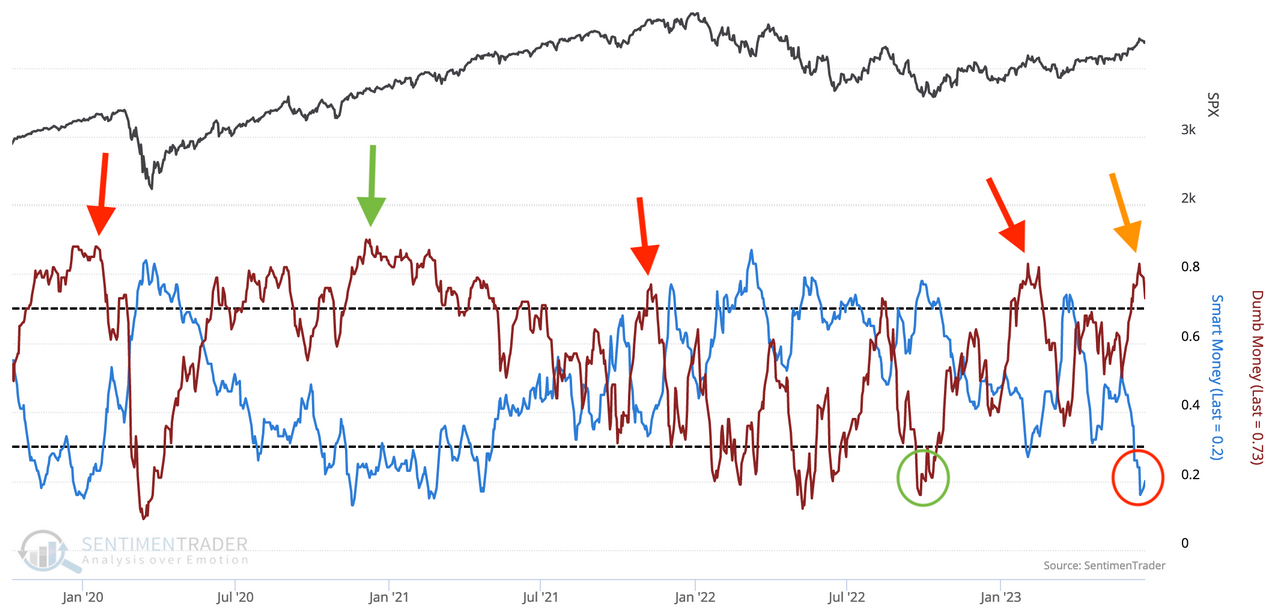Futures slip, bank earnings ahead, Powell to speak - what’s moving markets
Before proceeding, I’d like to remind you that this article is not written by a perma-bear. It is important to have credibility, and indeed, NFTRH planned for a potential humdinger of a bear market rally back in Q4, 2022 based on the inputs of then extremely over-bearish sentiment, the bullish mid-term election cycle (which on average projects bullish for a year, post-election), a coming fade in inflation signals (with the attendant hopes for a softening Fed) being its primary elements. Here is one post discussing the rally in November 2022.
There are plenty of other high-risk indicators currently in play on the macro, but focusing on one crucial indicator, let’s note that the extreme yield curve inversion that has taken place over the last year indicates that time is running out for the current macro backdrop, which sees a hawkish (and once again tardy, as it was with its silly “transitory inflation” blathering a couple of years ago) Fed tilting at the inflationary windmill it was primary in creating. Goldilocks, favoring Tech, Semiconductor, and Growth stocks, has held sway as we also projected.
Goldilocks lives during a yield curve flattener. She dies with a curve steepener.
The 10-Year-2-Year curve is burrowing southward, perhaps for a test of the inversion low earlier this year. While people tend to worry that a yield curve inversion is a trigger to economic recession, it is actually the steepening that follows that usually brings the trouble, whether it be inflationary or deflationary. *

Today’s situation tests the inverted levels of noisy events of the late 1970s to early 1980s. After a couple of recessions (shaded areas), that situation resolved pleasantly disinflationary (as opposed to outright deflationary) as the resulting steepener – after several stops and starts – never did become impulsive. Nor did the next yield curve inversion in 1989.

While there is much play in the wheel, with respect to the timing between the correlations of gold and the stock market (S&P 500 as the broad US measure) to the yield curve, gold is generally correlated to a steepening yield curve, and stocks are correlated to a flattening curve.
Gold is sought after when monetary regulators are indicated to be either losing control (under pains of inflation) ** or going overtly dovish (under deflation), while stocks would tend to either rotate toward commodity/resource producers and certain cyclical/value areas under inflation or go flat out bearish under deflation (as opposed to disinflationary Goldilocks) or more virulent stagflationary inflation.
Recall that gold led the 2020 inflation phase by a country mile and then led the correction in the traditional inflation trades (commodities, resources, and their producers) by another country mile as it saw the Fed donning its hawk costume as far back as August 2020. The Fed was tardy, but gold had been forecasting the hawk for some time before the eggheads actually got off their “transitory inflation” stance.
Goldilocks and the Tech-led stock market rally have enjoyed the inversion, as would be expected. When the new steepener follows, in concert with an oncoming recession, there will not be much enjoyment. What there will be is the end of this massively risk ‘ON’ phase, the job of which always was to turn Q4, 2022’s unsustainable over-bearish sentiment profile on its ear, to its opposite condition.
While over-bullish dumb money indicators have not always signaled a market top, they are always a condition for a top. That condition is in place now, whether or not the market has already begun its topping process (not yet technically indicated).

Gold, on the other hand, has been wearing its ‘anti-suit (or, more to the point, its “insurance” utility) generally since mid-2020 when the correction began. True to form, it did lead the broad rally in Q4 2022 until Goldilocks took over, dumb money got back in the game (perhaps climaxing with the recent AI hype fest), and speculative forces went into overdrive.
It’s all a sign of a coming top in speculation, and then there will be gold, as it always is. The end of the yield curve inversion and the coming of the next steepner will be an important signal even as we patiently manage the gold, silver, and miners correction on a weekly basis with clear downside objectives laid out back in April.
* A steepener is inflationary if nominal yields are rising and deflationary if they are falling. At this time we continue to expect the latter to be the case, but there are elements in play that could see a global inflationary situation regenerate sooner rather than later. So, open minds, at least…
** Today’s Fed is not indicated to have lost control. Quite the contrary; the Wizard is in full control as the market obsesses on every word out of its collective, and tardy orifice.
